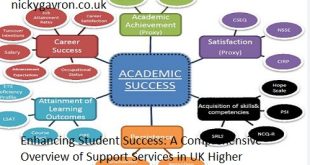Starting your higher education journey is an exciting venture, and planning your path can enrich your overall experience.
Every great journey begins with the first step, and in your case, the journey towards higher education begins with solid planning. But fear not, we have carefully outlined seven comprehensive tips to make this process as seamless as possible. Considering these seven pillars of planning, we hope to navigate you smoothly through your higher education application process, decision-making, and preparation.
“The future depends on what you do today.” – Mahatma Gandhi
Embody the truth of this quote as you forge a path towards your educational future. Remember, the actions you take today will significantly influence the course of your journey. Read on as we reveal the seven pivotal tips that will guide your planning process, setting you firmly on the road to success in your higher education endeavor.
Understanding Your Higher Education Goals
Now that you’ve identified your higher education goals, it’s essential to map out how to reach them. Remember, your journey is uniquely yours. With the right planning, every step you take can bring you closer to your dreams. Let’s explore some tips to help you chart your course.
1. Research Multiple Institutions: Don’t limit yourself to one or two schools. Instead, explore various institutions that offer programs aligning with your career goals. Examine the curriculum, faculty, student life, and post-graduation assistance. The more informed you are, the easier it will be to make the best choice.
2. Understand the Cost: Higher education is a significant investment. Factor in tuition, living expenses, books, and other costs to get a realistic estimate of what you’ll need. Consider potential financial aid, scholarships, and part-time work opportunities.
3. Plan your Time: Planning your course load each semester is key to balancing academic life with other responsibilities. Determining how many units to tackle each term can help you maintain a manageable workload.
4. Seek Career Guidance: Speak with university career counselors or professionals in your desired field. They can provide insights into industry trends and opportunities, better preparing you for the future.
5. Stay Flexible: Your goals and interests may evolve over time. Stay open to new opportunities; it’s okay to change your study focus or career path.
6. Network: Building relationships in college can open up opportunities in the future. Attend social and academic events, join student organizations, and connect with faculty and colleagues.
7. Maintain Your Health: Don’t forget to take care of your physical and mental health. Regular exercise, balanced nutrition, and adequate sleep can significantly influence your academic performance.
Armed with these tips, you’re well-prepared to embark on your higher education journey. Remember, the most important thing is to keep learning, stay motivated, and never lose sight of your goals, no matter the challenges ahead. You got this!
The Importance of Financial Planning
Without a doubt, planning for your higher education journey involves more than just choosing the right course and institution. One crucial aspect that often gets overlooked is financial planning. Indeed, higher education is a significant investment, and careful financial management is essential to making the most of it.
A well-constructed financial plan takes into account every aspect of your educational journey – from tuition fees, accommodation costs, day-to-day living expenses, to potential unforeseen costs. By understanding the complete picture, you can adequately prepare for the financial responsibilities and obligations that come with your academic pursuits.
So, how do you start with financial planning for your higher education? Here are some steps to consider:
- Plan ahead: Start saving early. The sooner you begin, the more you can accumulate over time, easing the financial burden when you finally embark on your higher education journey.
- Explore scholarship options: Scholarships offer an excellent opportunity to offset some costs. Research different scholarships and grants available in your chosen field and apply as applicable and eligible.
- Consider work-study programmes: Work-study programmes not only provide an income but can also give you invaluable practical experience in your field. This adds to your skill set and gives you a head start in your career.
- Create a budget: A detailed budget helps manage your money efficiently. It counts both large, fixed expenses (like tuition and rent) and smaller, variable costs (like groceries and entertainment).
Remember, financial planning is not just about preparing for expenses. It’s also about understanding the value of the investment you’re making in your education. With thorough financial planning, you can make informed decisions that will help you make the most of your higher education journey without the constant worry of financial strain.
Balancing Academics and Extra-Curricular Activities
Higher education isn’t solely focused on academics; it’s an enriching platform where all-around development gets the spotlight too. The agility to strike a balance between academics and extra-curricular activities often leads to a well-rounded personality and a more fulfilling college experience. But, it can get tricky to manage at times. Here are some tips to help you.
Firstly, identify your interests and strengths outside the academic sphere. This could be anything from music to sports, art to debate, volunteer work to leadership roles in student organizations. Once you have shortlisted your interests, start contemplating your participation in these activities. Ask yourself questions like, ‘How can I contribute?’ and ‘Do I see long-term growth or potential in these areas?’.
Take note – It’s essential not to go overboard. Dabbling in too many activities can lead to a lack of focus on academics. Opt a few activities that genuinely bring joy, growth, and meaningful experiences. Secondly, manage your time wisely. Create a realistic and flexible schedule accommodating both academic workload and chosen activities. The key factor here is open-mindedness to adjust according to the priorities, and sometimes it would mean choosing project deadlines over practise sessions or vice versa. It’s all about working smart!
Lastly, learn to say ‘No’. This might sound a bit assertive, but it’s crucial for maintaining a healthy balance. It can be easy to feel overwhelmed or burdened by taking on too many responsibilities. Learning to say ‘no’ will preserve your time and energy, ensuring you can allocate it where it matters most.
Remember, in the end, it’s not just about the grades, but also the skills and experiences you accumulate and the individual you evolve into during your higher education journey. The aim here is to embrace growth in every aspect of your college life.
Navigating through Scholarship Opportunities
So, you’ve dived into the sea of scholarship opportunities – fantastic! Scholarships can act as a lifeline to your higher education dreams by providing you much-needed financial support. But, navigating around them can seem daunting. Here’s how you can ease this undertaking.
Explore Widely and Dig Deeply
Firstly, cast a wide net in your scholarship hunt. Extensive exploration expands your range of potential options. Remember, scholarships are not strictly depended on academic achievements. Many scholarships appreciate talents in various fields like sports, arts, or community service. Rummage through all possible sources – colleges, non-profit organizations, private enterprises, and online scholarship platforms.
Organize Your Application Process
Pile up your potential scholarships and begin strategizing your application approach. Start by understanding their specific prerequisites, deadlines, required essays or recommendations. Creating a simple spreadsheet can be a helpful way to keep everything organized. The more efficiently you manage your application process, the more successful you’ll likely be.
Personalize Your Pitch
Every scholarship you apply for needs a unique approach – a one-size-fits-all method will not cut it. Tailor your applications to wire them towards each scholarship’s priorities. Are they promoting community involvement? Highlight your volunteering experience. Appreciating athletic prowess? Your sports achievements can take the front seat. A personalized application stands a better chance at catching the committee’s eye.
Never shy away from seeking help either. Reach out to teachers, counselors, or even past recipients to understand what works. Generating a strong application can be an iterative process, so consider each application an opportunity to learn and improve for the next one.
Remember, Persistence Pays
You may not always be successful in your scholarship applications but don’t let this deter you. Scholarship hunting is an endurance test as much as it is about suitability. Keep applying and improving. Persistence often reaps rewards, and it might just land you the scholarship that brings your higher education dreams within reach.
Mastering the art of navigating scholarship opportunities is no small feat, but with diligence and determination, you’re more than capable of turning the tide in your favor. Good luck!
Utilizing Academic Resources Effectively
Now that we’ve discussed recognizing and utilizing your available resources is a crucial part of planning out your higher education journey, let’s dig a little deeper into how you can make the most of these resources.
Stay Proactive and Plan Ahead: Always remember, the early bird gets the worm. Getting a head start can help you stay ahead of the curve, and ensure that you’re not left scrambling at the last minute. Look out for announcements or online schedules about various academic resources your institution offers. It could be workshops, webinars, or one-to-one consulting sessions, all designed to aid your academic success. Ensure to book in advance and make maximum use of them.
Establish Regular Study Groups: Learning doesn’t have to be a solitary act. Study groups are fantastic resources that you do not want to miss out on. They not only provide peer-to-peer interaction but also encourage brainstorming, improves understanding of complex topics, and develops a sense of responsibility. Encourage your classmates to form a study group and take advantage of this resource. Remember, two heads are better than one!
Attend Office Hours: Never underestimate the power of office hours. Your professors are an invaluable resource for your academic journey. Utilize their office hours to clarify doubts, garner feedback on assignments, and gain insights that go beyond classroom learning. It also offers the opportunity to build meaningful relationships with your instructors.
Embrace Online Learning Platforms: Today’s digital age opens up an absolute treasure trove of online learning resources. Websites such as Coursera, Khan Academy, LinkedIn Learning, and more offer a plethora of courses, video tutorials and webinars to supplement your classroom teaching. Some might even aid in getting a certification that bolsters your academic prowess.
In conclusion, higher education is a significant life event that requires meticulous planning and utilization of resources. Stay open and proactive. with your approach. These resources are here to help you achieve your academic goals, and with the proper planning, you’ll be well on your way to academic success.
Building a Supportive Network
Building a supportive network is crucial in your journey through higher education, a point that’s often underemphasized. This network can be comprised of your family, friends, mentors, career counselors, or academicians. They play an integral role in shaping your educational journey, providing you with both emotional support and practical advice.
You see, the pressures of academic life can sometimes feel overwhelming. From hitting the books relentlessly for exams to balancing co-curricular activities, there will be moments of self-doubt and exhaustion. During these times, a supportive network acts as your buoy, helping you stay afloat.
But how can you effectively build your network? Firstly, seek open communication with friends and teachers about your plans and aspirations. Attend university events and functions to meet new people. Speak to college seniors or alumni to learn from their experiences. Engage with students from different fields and cultures, broadening your perspectives and understanding of the world. Secondly, don’t hesitate to set up meetings with your career counselors or mentors to discuss your educational journey. Remember, they are there to help guide you through this complex, exciting journey, leverage that help.
Finally, foster strong relationships with your family. They are your first line of support, providing love, encouragement and, at times, some refreshing perspective when nothing seems to go right. Regular check-ins or conversations about your journey can help relieve stress and anxiety about the future. They keep you grounded and remind you of your intrinsic worth, even when the academic pressure threatens to crush your spirits.
While higher education can be a rewarding journey, it’s not a journey to embark on alone. So go ahead, build your supportive network, and witness how it enriches your academic experience in ways you may not have imagined.
The Power of a Well-Structured Study Schedule
Establishing a well-thought-out study schedule is a cornerstone of successful academic planning, but it’s not just about penciling in study hours on your calendar. It requires thoughtful organization, consistent commitment, and, importantly, some flexibility. Let’s delve deeper into these.
Evaluating your academic needs: Consider your course load and evaluate the study requirements. Some subjects may need more of your attention due to their complex nature, while others will require less time. Remember, each course is unique, and your study schedule should reflect that.
Consistency is key: Aim to study at the same time each day. This creates a consistent rhythm, like your own personal academic metronome, helping your brain get into a regular study mode. Remember this isn’t about cramming as much information as possible into a few late-night hours before the exam; It’s about consistent learning over time which helps information stick.
Plan for breaks: Never underestimate the power of downtime. Your brain needs time to process information, so make sure you schedule short breaks during your study sessions. Also, ensure that you have ample time for fun and relaxation. This prevents burnout and boosts productivity.
Remain flexible: A rigid schedule could set you up for stress, hence retain some flexibility to cater to unexpected events or high-stress periods. If you find that certain strategies aren’t working, don’t be afraid to reassess and adjust your schedule. Remember, this plan is not carved in stone; it should evolve as your needs do.
In conclusion, a well-structured study schedule empowers you to gain control over your educational journey, reduce stress, and ultimately, achieve your academic goals. Now that you have these tips, it’s time to craft a schedule that works best for you. Happy studying!
FAQs:
Q1: Why is understanding your higher education goals important?
Recognizing your educational objectives serves as a personal roadmap to your chosen career path. It aids in the selection of the right course, university, and extra-curricular programs that align with your ambitions.
Q2: How can financial planning impact my higher education journey?
Notably, managing finances is a critical aspect of higher education. Savvy planning can help ease the financial strain of tuition and living expenses, preventing potential disruption in your studies.
Q3: Can you explain the balance between academics and extra-curricular activities?
A balanced blend of academics and extra-curricular activities promotes holistic development, nurturing both the mind and personality. Striking the right balance can enhance your university experience while shaping your future prospects.
Q4: How can I navigate through scholarship opportunities?
There is a plethora of scholarships available for eligible students. A strategic search tailored to your academic achievements, personal interests, and financial need will increase your chances of securing scholarship funding.
Q5: How can I effectively utilize academic resources?
Academic resources, including online material, books, university libraries, and professor consultations, are indispensable for your progress. Utilizing these resources can significantly assist in comprehending challenging material and completing assignments.
Q6: Why is building a supportive network essential?
Networking with classmates, professors, and industry professionals can provide opportunities for collaboration, mentorship, and career advancement. It’s an invaluable component of successfully navigating the higher education landscape.
Q7: How can a well-structured study schedule enhance my studies?
A well-planned study routine allows for effective time management. It ensures consistent progress in all courses, minimizes stress, and helps maintain a balance between academic responsibilities and personal interests.




